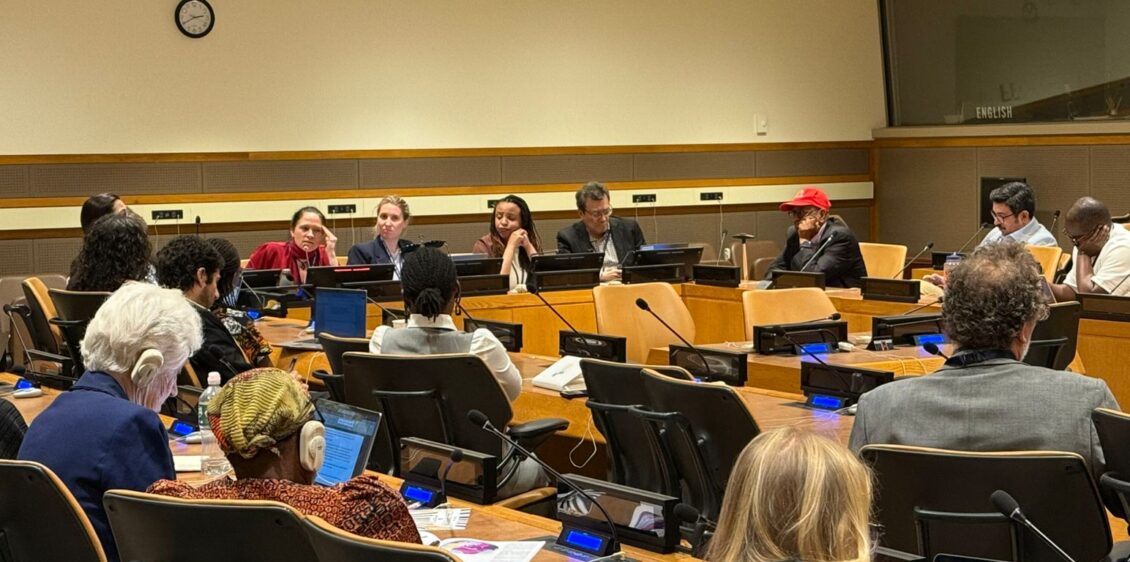The first substantial session of the UN Framework Convention on International Tax Cooperation (UN Tax Convention) began August 4 and run until August 15 at the UN Headquarters in New York. At the start of the negotiations, the Global Alliance for Tax Justice (GATJ) as co-coordinators of the Tax Justice Workstream of the Civil Society Financing for Development (CS FfD) Mechanism, held a side event on August 5th. The event brought together delegates, civil society, and other stakeholders for an important discussion on what is needed in the UN Tax Convention.
Lison Rehbinder, Global Alliance for Tax Justice, opened the side event: “As civil society, we have been campaigning for over a decade for tax negotiations be brought to the UN, so all Member States to be at the table as equals and for negotiations to rewrite the deeply flawed and unjust tax global tax rules. These negotiations happen at critical moment, when countries desperately need public resources to fund gender-transformative public services, to fight the climate crisis, and to guarantee the realization of human rights. This process is a historic opportunity to create an international tax system to deliver finance and to transform a system that is still deeply unjust for countries of Global South, rooted in colonialism and depriving them of their taxing rights.
As civil society, we have proposals for all this, we have done our homework. We have a three joint submissions with detailed demands and ask, from over a hundred organizations. We need a fair, equitable, progressive, effective, inclusive, sustainable and transparent UN Tax Convention.”
A UN Tax Convention for Sustainable Development
The adopted UN Tax Convention Terms of Reference has the agreed objective of establishing “an inclusive, fair, transparent, efficient, equitable and effective international tax system for sustainable development.” Taxation, and international tax cooperation in particular, is deeply linked to sustainable development and issues of financing for development.
“Core issues agreed in the financing for development process must be brought into the UN Tax Convention. The Compromiso de Sevilla, the FfD4 outcome document, includes these elements: gender-responsive taxation, human rights especially the right to development, progressive tax systems and addressing inequalities, fighting illicit financial flows, and climate justice,” shared Nathalie Beghin, Red de Justicia Fiscal de America Latina y el Caribe and Latindadd.
Speakers highlighted the importance of connecting the UN Tax Convention negotiations to other negotiations at the UN; on healthcare, development, environment, and more which all face issues when discussing the financing of these commitments. Nathalie Beghin added, “There is a lot of money and when the Global North says that they don’t have money we know that it is not true. The Global North has the money to deliver on their climate finance and human rights obligations.“
A Robust Convention
Speakers stressed the importance of a robust convention to reduce global complexity in the international tax system and ensure effective international tax cooperation. Tove Maria Ryding, Eurodad, shared: “A framework convention is not an empty convention. Framework conventions are strong on issues including objectives and have many commitments, such as in the climate convention. Wherever possible, commitments should be clear and strong to make them implementable by the future Conference of the Parties.”
A Fair Allocation of Taxing Rights and Digital Services Taxes
Speakers highlighted the need for effective taxation of all industries to be able to collect the revenues urgently needed as well as to correct historic and ongoing injustices, heightening inequalities between the Global South and North. “We need to address this problem of wealth transfer where the richest countries take from the poorest countries. One piece of that is implementing digital services taxes,” Tony Salvador, Third World Network.
A key conversation has been on the fair allocation of taxing rights, to move away from the colonial-era transfer pricing system and move to a unitary taxation system. Everlyn Muendo, Tax Justice Network Africa, shared: “We need a fair allocation of taxing rights to effectively tax multinational corporations because, for African countries and many other Global South countries, it is not possible under the current allocation of taxing rights. We do not have taxing rights on the income that arises from the activities in our countries. A majority of the rules on taxing rights were developed when many of our countries did not have political independence and has led to the continued extraction of wealth from our regions. Then, the proposals on tax coming out of the OECD processes were not made by us as Africans – nor for us – and they do not speak to our realities. Now, these UN Tax Convention negotiations are changing this.”
Tax is Political
As the first two sessions of negotiations continue until August 15, Everlyn Muendo shared the importance of this moment: “We need everyone to approach the negotiations in good faith. Lives are at stake. Taxes fund food, water, health, and education. This is not a trivial matter.”
–
Watch the full side event on UN Web TV here.
